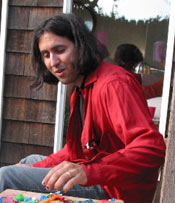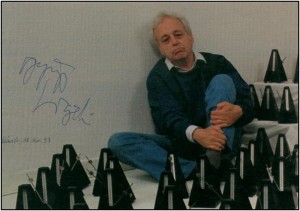
When the 2010 Composer Collaboration Awards call for proposals went out on May 10, 2010, music presenters, ensembles, and composers all over the San Francisco Bay Area called, paged, and emailed one another, then got together to put their dream projects down on paper in time for the deadline.
Today the staff and Boards of six organizations, their chosen composers, and their artistic collaborators are popping champagne corks and dancing around their offices. They’ve received $75,000 each from the Wallace Alexander Gerbode Foundation and the William and Flora Hewlett Foundation, to make six world premieres.
Cabrillo Festival of Contemporary Music – Laura Karpman and Independent
Producers/Authors, The Kitchen Sisters
The Cabrillo Festival is one of the leading festivals dedicated to contemporary classical music. The work brings together Emmy award-winning composer Laura Karpman together with The Kitchen Sisters (authors and radio producers Nikki Silva and Davia Nelson) to create a multi-media, full evening length symphonic production titled The Hidden World of Girls. The Hidden World of Girls will focus on stories of lives shaped by the secrets girls carry with them into adulthood. The premiere is scheduled for July 28 & 29, 2012 at the 50th anniversary season of the Cabrillo Festival.
Corporation of the Fine Arts Museums (FAMSF) – Sarah Wilson and Aerial Dance Company, Catch Me Bird
Inspired by the incredible architecture, landscape and visual arts collections of the de Young Museum, Off the Walls will be a new jazz composition for aerial dance, which will be performed at assorted locations outside, inside and on the sides of the museum. It will be an evening length, site-specific work performed by composer Sarah Wilson, Catch Me Bird Aerial Dance Company, and an ensemble of 12-18 Bay Area musicians and dancers. The premiere is scheduled for March 2013.
Jewish Community Center of San Francisco – Mark Izu and Choreographer, Kimi Okada
The JCCSF’s Friend Center for the Arts aims to create a forum for innovative projects in multi-disciplinary and multicultural contemporary and traditional performance. It will commission a multi-media, multi-disciplinary work composed by Mark lzu and choreographed by Kimi Okada entitled Mu. Incorporating Korean, African, Indian, Japanese, and Hawaiian traditional music and dance, the piece heralds the end of the Mayan calendar and uses the legend of Mu, an ancient empire of blessings and noble values destroyed by materialism and greed, as a parable for today. The premiere is scheduled for December 2012.
Movimiento de Arte y Cultura Latino Americana de San Jose Incorporated (MACLA) – Guillermo Galindo and Chamber Ensemble, Quinteto Latino
MACLA is a San Jose-based contemporary arts space grounded in the Chicano/Latino experience. The company incubates new visual, literary and performance art in order to engage people in civic dialogue and community transformation. Guillermo Galindo and Quinteto Latino will create Voces del Desierto, a piece that will explore the journeys of unnamed immigrants who cross the Mexican-American border in search of a better life. The premiere is scheduled for late 2011 or early 2012.
San Francisco Girls Chorus – Gabriela Lena Frank and Librettist, Nilo Cruz
One of the premier girls’ choruses in the U.S., the San Francisco Girls Chorus will commission Gabriela Lena Frank to create a cantata for treble chorus, chamber orchestra, and vocal soloists in collaboration with librettist Nilo Cruz. Marrying Western classical music tradition with Latin American folk music, Holy Daughters (working title) examines the cultural clash and interchange between European colonialism and indigenous tradition, and the role and perception of women in both worlds. The premiere is scheduled for June 2013.
Z Space Studio (Z Space) – Marcus Shelby and Co-Creator, Margo Hall
Known nationally as a premier performance development lab for artists, Z Space will create a new work by composer/musician Marcus Shelby and actor/director/singer Margo Hall. The new musical performance piece will explore the journey of a young black woman growing up in Detroit during one of the most exciting times for music and one of the most turbulent for civil rights. Loosely based on Ms. Hall’s life, Detroit represents a link to her childhood where her father was a well-known Detroit musician and as a child, she sang with her “aunties,” who were members of the Supremes band. The premiere is scheduled for January/February 2013.
 If, like me, you’re a composer and you routinely ask yourself “What am I doing six months from now? Can I get something on the calendar?”,
If, like me, you’re a composer and you routinely ask yourself “What am I doing six months from now? Can I get something on the calendar?”, 


 The 15th Other Minds Festival kicks off this evening, offering San Francisco a three-day immersion in contemporary music from around the world. One of the locals headlining this year is
The 15th Other Minds Festival kicks off this evening, offering San Francisco a three-day immersion in contemporary music from around the world. One of the locals headlining this year is  2009 Frederic A. Juilliard/Walter Damrosch Rome Prize winner
2009 Frederic A. Juilliard/Walter Damrosch Rome Prize winner 

 Many of us can recall a time, back in the day, when we brought cups of strong coffee to class and heard a professor tell us about the distant early days of “new music”. Long, long ago, in a galaxy far, far away (Italy),
Many of us can recall a time, back in the day, when we brought cups of strong coffee to class and heard a professor tell us about the distant early days of “new music”. Long, long ago, in a galaxy far, far away (Italy),